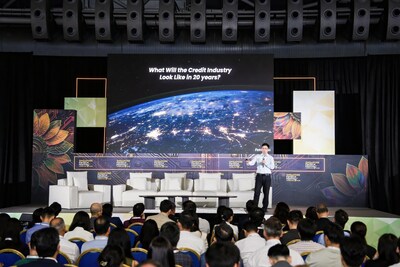-
Mapping AI's journey in finance: from prediction to partnership
At the Singapore FinTech Festival 2025, FinVolution showcased a new vision for AI in finance, one where machines do more than forecast risks.
SINGAPORE, Nov. 12, 2025 /PRNewswire/ -- At the 2025 Singapore FinTech Festival, FinVolution Group's Vice President Lei Chen painted a vivid picture of finance transformed by artificial intelligence.
From forecasting risks to reasoning through complex decisions, his insights showcased how AI is evolving from a predictive tool into a true strategic partner, reshaping how institutions approach credit, fraud prevention, and customer engagement.
Speaking in a keynote titled "AI-Driven Financial Evolution: Beyond Forecasting," Chen emphasized that the era of AI in finance is no longer about automation alone; it is about building intelligent, secure, and transparent systems that collaborate with humans to enable smarter, more responsible decisions.
He noted that AI has entered a new phase in the financial sector, evolving from a tool for prediction into a robust collaborator capable of reasoning, understanding context, and engaging in complex decision-making.
This transformation is redefining not only the financial ecosystem but also the relationship between technology and humanity. "The essence of AI in finance is not only about smarter predictions," Chen said. "It's about enabling machines to think, reason, and collaborate responsibly."
In the early years, AI in finance was primarily used for forecasting, detecting patterns, predicting credit risks, and optimizing lending. Today, AI is moving toward reasoning, enabling systems to answer not only "what will happen," but "why it happens" and "what actions could follow."
Chen described this as a shift from automation to collaboration -- an evolution from pattern recognition to decision intelligence. Through domain-specific reasoning, adaptive learning, and model alignment, financial AI systems can now simulate decision-making while maintaining explainability and compliance.
"This marks the transformation from 'AI for assistance' to 'AI for partnership'," Chen explained. "The boundary between who is human and who is AI is blurring -- creating seamless, hybrid workflows that integrate machine logic with human judgment."
Such human–AI integration allows institutions to deliver faster, fairer, and more inclusive financial services. At FinVolution, these capabilities already extend across customer service, credit evaluation, and risk control, enabling more efficient decision-making processes and empowering millions of underserved consumers.
Chen also emphasized that as AI evolves, security must evolve with it. The rise of generative AI has opened the door to voice cloning, identity fraud, and deepfake manipulation, introducing new layers of systemic risk.
"These challenges push us to innovate even faster, building technology that can tell real from fake with increasing precision," he said.
To address this, FinVolution has deployed multimodal anti-spoofing technologies that integrate visual, voice and behavioral biometrics to detect complex fraud attempts in real time. The company also leads industry-wide collaborations to build shared security standards, promoting transparency and accountability across the financial ecosystem.
This aligns with Chen's call for building a cross-industry commitment to strengthening AI governance through an ecosystem comprising regulators, academia, and industry players.
Human-AI integration
Chen described human–AI integration as the defining feature of digital finance's next frontier. Traditionally, humans made final decisions while machines perform pre-screening. But as AI acquires greater reasoning capacity and multimodal understanding, it is becoming an extension of human capability. Under the human-AI symbiosis, machines amplify human insight and humans guide machine integrity.
"In customer service, AI agents are no longer just assistants; they act as co-workers, or even digital twins of human agents," Chen said.
In FinVolution's operational model, AI agents handle complex, long-tail tasks -- from identifying subtle fraud behaviors to managing multilingual customer interactions -- while humans provide ethical oversight and empathy. Together, they form a continuous learning loop that blends precision with sensitivity.
At FinVolution, its proprietary E-LADF large model development platform combines with the Zeta agent innovation platform, enabling AI to support key areas like code generation, marketing, risk control and customer operations.
This hybrid model is supported by the integration of general large models and smaller domain-specific models -- ensuring that financial decisions are both contextually intelligent and operationally precise. "In finance, large models may understand intent, but small models detect subtle fraud patterns, such as facial micro-expressions used to fool recognition systems," Chen remarked.
Such an architecture allows AI to scale responsibly while maintaining the depth and control required in high-stakes financial applications.
Chen stressed that the success of intelligent finance will ultimately hinge not only on technological prowess, but also on responsibility. Ethical AI design must remain the cornerstone of financial innovation.
"In intelligent finance, speed and scale matter -- but responsibility defines success," Chen concluded. "AI must empower innovation while safeguarding fairness and security. Only then can the financial industry achieve sustainable and inclusive growth."
![]() View original content to download multimedia:https://www.prnewswire.com/apac/news-releases/mapping-ais-journey-in-finance-from-prediction-to-partnership-302612646.html
View original content to download multimedia:https://www.prnewswire.com/apac/news-releases/mapping-ais-journey-in-finance-from-prediction-to-partnership-302612646.html
SOURCE FinVolution Group







